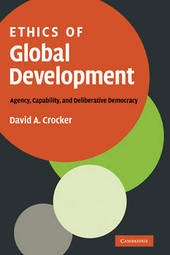
|
Ethics of Global Development: Agency, Capability, and Deliberative Democracy
Hardback
Main Details
| Title |
Ethics of Global Development: Agency, Capability, and Deliberative Democracy
|
| Authors and Contributors |
By (author) David A. Crocker
|
| Physical Properties |
| Format:Hardback | | Pages:432 | | Dimensions(mm): Height 235,Width 158 |
|
| Category/Genre | Development economics |
|---|
| ISBN/Barcode |
9780521885195
|
| Classifications | Dewey:338.9 |
|---|
| Audience | | Professional & Vocational | |
|---|
| Illustrations |
2 Line drawings, unspecified
|
|
Publishing Details |
| Publisher |
Cambridge University Press
|
| Imprint |
Cambridge University Press
|
| Publication Date |
10 July 2008 |
| Publication Country |
United Kingdom
|
Description
Poverty, inequality, violence, environmental degradation, and tyranny continue to afflict the world. Ethics of Global Development offers a moral reflection on the ends and means of local, national, and global efforts to overcome these five scourges. After emphasizing the role of ethics in development studies, policy-making, and practice, David A. Crocker analyzes and evaluates Amartya Sen's philosophy of development in relation to alternative ethical outlooks. He argues that Sen's turn to robust ideals of human agency and democracy improves on both Sen's earlier emphasis on 'capabilities and functionings' and Martha Nussbaum's version of the capability orientation. This agency-focused capability approach is then extended and strengthened by applying it to the challenges of consumerism and hunger, the development responsibilities of affluent individuals and nations, and the dilemmas of globalization. Throughout the book the author argues for the importance of more inclusive and deliberative democratic institutions.
Author Biography
David A. Crocker is Senior Research Scholar at the Institute for Philosophy and Public Policy and the School of Public Policy at the University of Maryland. He is an officer of the Human Development and Capability Association, and was founder and a former president of the International Development Ethics Association (IDEA).
Reviews'David Crocker's book opens up, in the most consistent manner, an area only imperfectly explored so far: the ethics of global development. It discusses whether there are duties of rich countries and individuals toward the poor. What is global justice? How fair is the existing trade system? What is the place of migration? As the world becomes more interdependent, these questions, generally discussed within the confines of the nation-state, will have to be addressed at a global level. David's book is a big step in that direction.' Branko Milanovic, World Bank and Carnegie Endowment, Washington 'The inclusion of second-generation rights makes it possible to integrate ethical issues underlying general ideas of global development with the demands of deliberative democracy, both of which connect with human rights and quite often with an understanding of the importance of advancing human capabilities. In his far-reaching contribution to this integration in Ethics of Global Development: Agency, Capability and Deliberative Democracy, David Crocker points out that because agency and valuable capabilities are 'the basis for human rights, social justice, and both individual and collective duties', a development ethic will also examine how a globalized world is a help or a hindrance as individuals and institutions fulfil their moral obligation to respect rights. He goes on to argue that 'the long-term goal of good and just development - whether national or global - must be to secure an adequate level of agency and morally basic capabilities for everyone in the world - regardless of nationality, ethnicity, religion, age, gender, or sexual preference.' It is only with the inclusion of second-generation rights that this kind of a radical proposal for extended integration becomes possible, without taking us beyond the human rights framework.' Amartya Sen, The Idea of Justice 'This book is a testimony to the coming of age of development ethics as a separate subfield at the crossroads of ethics and the social sciences - in particular, development studies. David Crocker provides [an] historical sketch of the emergence and growth of development ethics over the last decades, and also revisits some of his own earlier work in the field to add newer analyses, extensions, and reflections. The result is Crocker's theory of the ethics of development, which is based on an agency-focused version of the capability approach, enriched by insights from the theory of deliberative democracy ... Overall, Ethics of Global Development is a highly readable, informative book that draws much of its strength from Crocker's long career in development ethics, including his work in such organizations as the International Development Ethics Association (IDEA), and his profound knowledge of a long period of disciplinary and interdisciplinary debates. ... This book is highly recommended to anyone who wants to know what development ethics has to offer, or who wants to engage with arguments on the role of the capability approach and the ideas of deliberative democracy in development ethics. Crocker's lucid writing style and his long experience in the field make this not just an important contribution to the scholarly literature on development ethics, but also excellent for teaching purposes.' Ethics and International Affairs
|